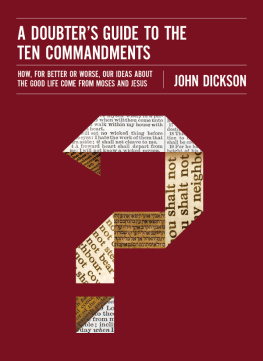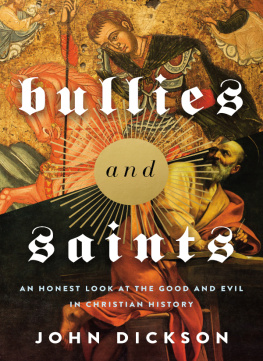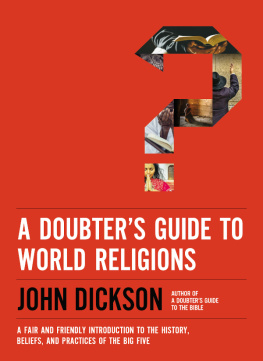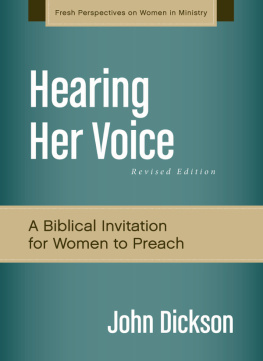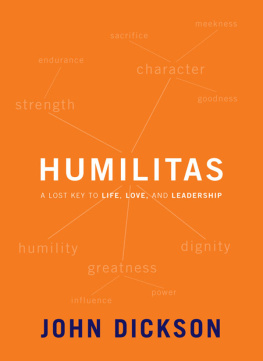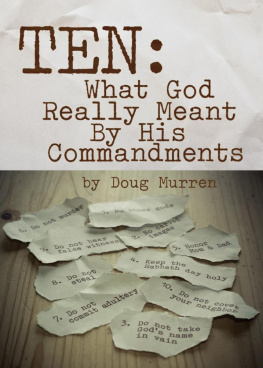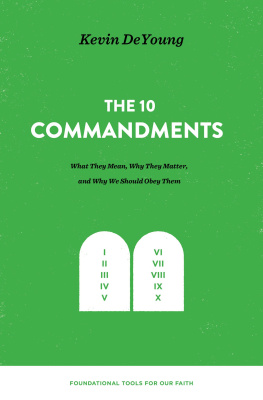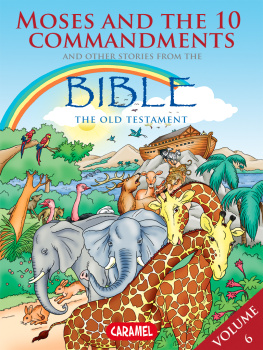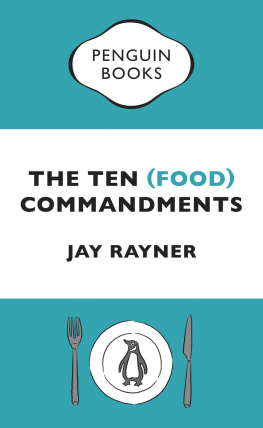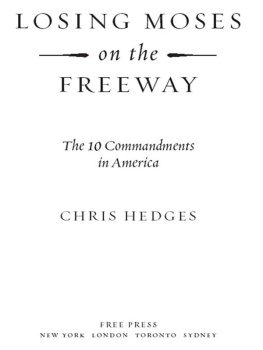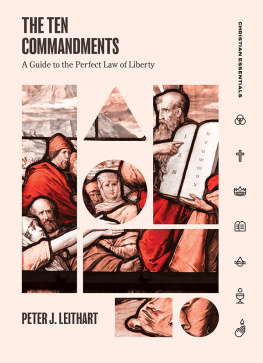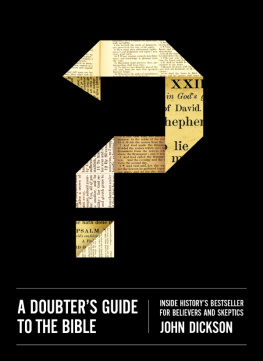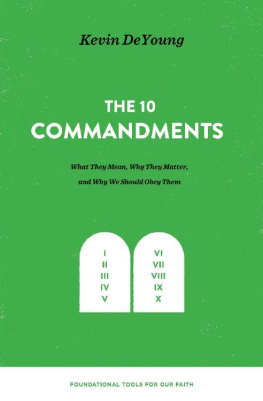
OTHER BOOKS BY JOHN DICKSON
A Doubters Guide to the Bible
Hearing Her Voice, Revised Edition
Humilitas
Life of Jesus
The Best Kept Secret of Christian Mission
The Christ Files
ZONDERVAN
A Doubters Guide to the Ten Commandments
Copyright 2016 by John Dickson
ePub Edition April 2016: ISBN 978-0-3105-2260-7
Requests for information should be addressed to:
Zondervan, 3900 Sparks Dr. SE, Grand Rapids, Michigan 49546
Library of Congress Cataloging-in-Publication Data
Names: Dickson, John P., 1967- author.
Title: A doubters guide to the Ten Commandments : how, for better or worse, our ideas about the good life come from Moses and Jesus / John Dickson.
Description: Grand Rapids : Zondervan, 2016.
Identifiers: LCCN 2015049556 | ISBN 9780310522591 (softcover)
Subjects: LCSH: Ten commandments Criticism, interpretation, etc.
Classification: LCC BV4655 .D42 2016 | DDC 241.5/2 dc23 LC record available at http://lccn.loc.gov/2015049556
All Scripture quotations, unless otherwise indicated, are taken from The Holy Bible, New International Version, NIV. Copyright 1973, 1978, 1984, 2011 by Biblica, Inc. Used by permission of Zondervan. All rights reserved worldwide. www.Zondervan.com. The NIV and New International Version are trademarks registered in the United States Patent and Trademark Office by Biblica, Inc.
Any Internet addresses (websites, blogs, etc.) and telephone numbers in this book are offered as a resource. They are not intended in any way to be or imply an endorsement by Zondervan, nor does Zondervan vouch for the content of these sites and numbers for the life of this book.
All rights reserved. No part of this publication may be reproduced, stored in a retrieval system, or transmitted in any form or by any means electronic, mechanical, photocopy, recording, or any other except for brief quotations in printed reviews, without the prior permission of the publisher.
Cover design: Studio Gearbox
Cover images: Thinkstock; Shutterstock
Interior design: David Conn
16 17 18 19 20 21 22 23 /DHV/ 20 19 18 17 16 15 14 13 12 11 10 9 8 7 6 5 4 3 2 1
For Edwin Judge, who has inspired so many, including me, to read ancient texts (Greek, Roman, and biblical) and notice their impact on the personality of the West.
CONTENTS
T he Ten Commandments are among the great cultural icons of the West. Even among those who cant quite list all ten, many say they pretty much live by the Ten Commandments. They are probably right. The social impact of this ancient moral charter is so great that most people living in the West even in my post-Christian Australia are living by the Ten Commandments, pretty much. These rules seem to represent, consciously or not, what Westerners think of as the Good (as Socrates called it) the happy union of the goal of human society and the virtues needed to get there.
Naturally, many Westerners prefer to say their vision of the Good is grounded in secular ethical reasoning (not religion), the sort of code any rational human being would aspire to under the right conditions. I dont believe that, and I hope I wont lose friends right here on the first page by saying that much of what is called secular ethical reasoning is just a minor revision of the Ten Commandments of Moses with a bit of Jesus of Nazareth thrown in.
These two ancient teachers have influenced us more than we might imagine. Like great-grandparents who fled a war-torn land to establish their family in an entirely new culture, Moses and Jesus have shaped our outlook and choices immeasurably, even if we dont know it. We may never have met them. Perhaps weve never even glanced at the family tree. But we are their great-grandchildren. They are our heritage and our ethical homestead.
I am reminded of the great twentieth-century British thinker and writer G. K. Chesterton, who compared his philosophical journey to unwittingly discovering his own home. As an educated free-thinker, as they used to call sceptics, he explored the world of ideas, confident that Christianity had very few of the important answers (or even questions). But when he stumbled across the intellectual and moral landscape he most admired, he was shocked to discover it looked like Christianity. He compared himself to an adventurous yachtsman determined to explore new frontiers, only to find that he had discovered England under the impression that it was a new island in the South Seas. Finding Christianity was a mistake, he said, but a happy one: What could be more delightful than to have in the same few minutes all the fascinating terrors of going abroad combined with all the humane security of coming home again? (Orthodoxy [Image Books, 1959], 9 13). Like Chesterton, many thoughtful folk have walked away from the religion associated with their childhood, or with childishness per se, only to realise that some of their most mature free thoughts about justice, compassion, human rights, freedom, and so on are just an adult version of the Judeo-Christian worldview they thought theyd left behind.
Influential political philosopher Jrgen Habermas who remains an atheist acknowledges the monumental cultural influence of Moses and Jesus. The West, he reckons, was shaped by the fairness ethic of Judaism and the compassion ethic of Christianity. Egalitarian universalism, he says, from which sprang the ideas of freedom, human rights and democracy, is the direct heir to the Judaic ethic of justice and the Christian ethic of love. To this day, there is no alternative to it (Jrgen Habermas, Time of Transitions [Polity, 2006], 150 51).
Habermass division between the Judaic ethic of justice and the Christian ethic of love is probably too neat (Im sure hed agree). Its not like Moses never talked about love nor Jesus about justice. But Habermas does put his finger on an important historical truth about the way the Ten Commandments came into Western culture. They arrived in Christian form. What I mean is that Judaism per se did not convert the West. Christianity did. And wherever Christianity went, the Jewish Scriptures, or Old Testament, complete with the teachings of Moses, also went. It was the specifically Christian vision of the Ten Commandments that gave the West its egalitarian universalism, as Habermas puts it, its peculiar ideas of freedom.
Throughout this book I will use the expression Judeo-Christian many times. For some it is a damaged descriptor, too heavily associated with right-wing politics or with a move to revive biblical law in legislation. Writing in Israels Haaretz (26 Jan, 2015), Benjy Cannon offered a stinging reminder of how loaded and potentially exclusionary Judeo-Christian can be: on the lips of some, he says, it means little more than, Its my America, not yours! Jewish readers may also feel uncomfortable being lumped together with Christians! Thats problematic. None of these connotations are intended in my use of the term. The expression has a long history, going back to the post-classical Latin Judaeo-Christianus. In English it has been with us since at least the 1800s as a technical description of beliefs philosophical, ethical, theological that are common to both traditional Judaism and traditional Christianity (but not shared by Greco-Roman culture). Hence the Judeo-Christian view of God, or the Judeo-Christian commitment to charity, and so on. It is important for me, both academically and personally, not to give the impression either that Christianity popped out of nowhere or to suggest that the church invented all the good things of Western culture. The Jewish background of Christian thought is vital for any accurate account of Western history. (And, yes, it is also true that Greece and Rome shaped Western civilization in many other profound ways: the term Greco-Roman is used for that influence. But thats for another book.)
Next page
